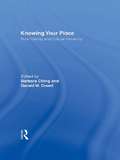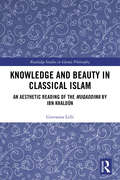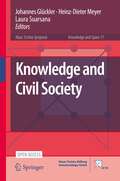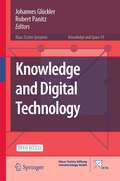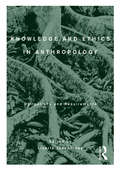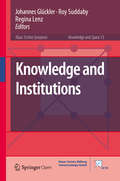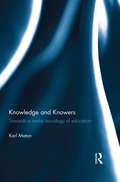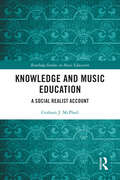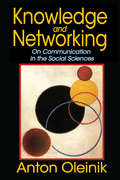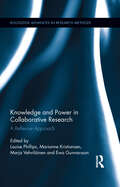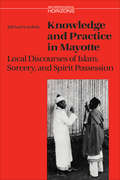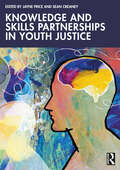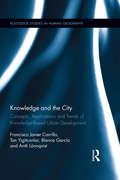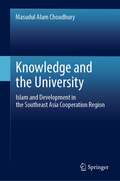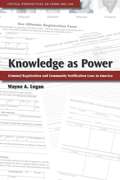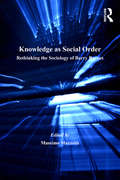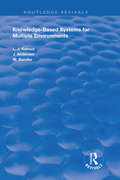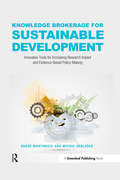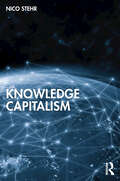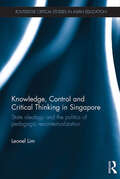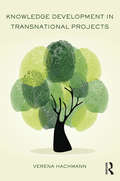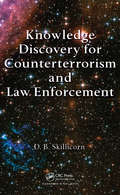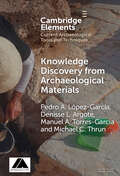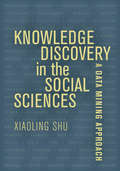- Table View
- List View
Knowing Your Place: Rural Identity and Cultural Hierarchy
by Barbara Ching Gerald W. CreedKnowing Your Place directs groundbreaking attention to the role of rural and urban places in identity construction. Written to redress the longstanding neglect and denigration of the rural, this book argues that the cultural dominance of the city has been reinforced by postmodern theory's near fixation on the urban and the sophisticated. The essays explore rural identity in a number of cultures and situations, and look at issues of contemporary interest. Topics covered include the uses of popular and high culture, the explosion of high technology, the social and economic impact of ecological policy, the role of labor in the global marketplace, museum curatorship, and post-colonial politics. Throughout, the essays address the many ways in which place identity alters and influences the experience of race, class, gender and ethnicity.
Knowledge and Beauty in Classical Islam: An Aesthetic Reading of the Muqaddima by Ibn Khaldūn (Routledge Studies in Islamic Philosophy)
by Giovanna LelliThis volume offers an aesthetic reading of the Muqaddima by Ibn Khaldūn (d. 1406), a text that has been studied up to the present as a work on historiography. It argues that the Muqaddima is also a comprehensive treatise on classical Arab-Islamic culture and provides a picture of classical Arab-Islamic aesthetics in its totality. The theme of the book is the intrinsic connection between beauty and knowledge in the Muqaddima. Whenever Ibn Khaldūn deals with the problem of knowledge and science, he also deals with the problem of sensual beauty as an instrument or an obstacle to attain it. Ibn Khaldūn’s philosophy of history is necessarily also an aesthetics of history. His key-notion of “group feeling”, the physical, ethic and aesthetic virtue of Bedouin societies, is at once the origin of the ascent of centralised States and the cause of their ruin. It represents a tragic contradiction that applies to the history of the Maghreb but then takes a universal value. It reflects a range of other contradictions inherent to the "system" of classical Arab-Islamic aesthetics. These contradictions undermine the aesthetic system of the Muqaddima from within and provide decisive elements for the emergence of modern aesthetics. Offering a comparative approach, the volume is a key resource to scholars and students interested in Arabic and Islamic studies, philosophy, aesthetics and global history.
Knowledge and Civil Society (Knowledge and Space #17)
by Johannes Glückler Laura Suarsana Heinz-Dieter MeyerThis open access book focuses on the role of civil society in the creation, dissemination, and interpretation of knowledge in geographical contexts. It offers original, interdisciplinary and counterintuitive perspectives on civil society. The book includes reflections on civil and uncivil society, the role of civil society as a change agent, and on civil society perspectives of undone science. Conceptual approaches go beyond the tripartite division of public, private and civic sectors to propose new frameworks of civic networks and philanthropic fields, which take an inclusive view of the connectivity of civic agency across sectors. This includes relational analyses of epistemic power in civic knowledge networks as well as of regional giving and philanthropy. The original empirical case studies examine traditional forms of civic engagement, such as the German landwomen’s associations, as well as novel types of organizations, such as giving circles and time banks in their geographical context. The book also offers insider reflections on doing civil society, such as the cases of the Umbrella Movement in Hong Kong, epistemic activism in the United States, and the #FeesMustFall movement in South Africa.
Knowledge and Digital Technology (Knowledge and Space #19)
by Johannes Glückler Robert PanitzThis open access book explores the multifaceted interplay of technology, knowledge, and place. While digital technology is increasingly influencing our way of knowing, conversely it is itself the consequence of human creativity and local social interaction. Part I analyzes how digital technologies transform markets through artificial intelligence and decentralized blockchain models. Its contributions discuss novel governance mechanisms, including the responsible use and analysis of big data. Part II illustrates various ways in which technology supports humanity, be it algorithms supporting complex decision-making processes or the use of robotics in care services. The chapters highlight that technology's efficiency and potential rely on social norms and human capital. Finally, Part III shows that digitization is generating vibrant entrepreneurship, reflected in geographically clustered urban scale-up economies, as well as opening up new ways for people to connect with one another, organize civic engagement and enable new forms of labor. The book offers theoretical reflections as well as empirical cases from the United States, Canada, Japan, South Africa, and Europe. This volume provides a valuable read for scholars, students and professionals in the fields of knowledge creation, technology and governance.
Knowledge and Ethics in Anthropology: Obligations and Requirements (Criminal Practice Ser. #31)
by Lisette JosephidesInspired by the work of world-renowned anthropologist Marilyn Strathern, this collection of essays features contributions from a range of internationally recognized scholars – including Strathern herself – which examine a range of methodologies and approaches to the anthropology of knowledge.The book investigates the production of knowledge through a variety of themes, centered on the question of the researcher’s obligations and the requirements of knowledge. These range from the obligation to connect with local culture and existing anthropological knowledge, to the need to draw conclusions and circulate what has been learned. Taking up themes that are relevant for anthropology as a whole – particularly the topic of knowledge and the ethics of knowing others, as well as the notion of the local in a global world – Knowledge and Ethics in Anthropology is key reading for students and scholars alike. A thorough introduction to the key concepts and terms used in Strathern’s work is provided, making this a fantastic resource for anyone encountering her work for the first time.
Knowledge and Institutions (Knowledge and Space #13)
by Johannes Glückler Roy Suddaby Regina LenzThis open access book bridges the disciplinary boundaries within the social sciences to explore the role of social institutions in shaping geographical contexts, and in creating new knowledge. It includes theorizations as well as original empirical case studies on the emergence, maintenance and change of institutions as well as on their constraining and enabling effects on innovation, entrepreneurship, art and cultural heritage, often at regional scales across Europe and North America. Rooted in the disciplines of management and organization studies, sociology, geography, political science, and economics the contributors all take comprehensive approaches to carve out the specific contextuality of institutions as well as their impact on societal outcomes. Not only does this book offer detailed insights into current debates in institutional theory, it also provides background for scholars, students, and professionals at the intersection between regional development, policy-making, and regulation.
Knowledge and Knowers: Towards a realist sociology of education (Legitimation Code Theory)
by Karl MatonWe live in ‘knowledge societies’ and work in ‘knowledge economies’, but accounts of social change treat knowledge as homogeneous and neutral. While knowledge should be central to educational research, it focuses on processes of knowing and condemns studies of knowledge as essentialist. This book unfolds a sophisticated theoretical framework for analysing knowledge practices: Legitimation Code Theory or ‘LCT’. By extending and integrating the influential approaches of Pierre Bourdieu and Basil Bernstein, LCT offers a practical means for overcoming knowledge-blindness without succumbing to essentialism or relativism. Through detailed studies of pressing issues in education, the book sets out the multi-dimensional conceptual toolkit of LCT and shows how it can be used in research. Chapters introduce concepts by exploring topics across the disciplinary and institutional maps of education: -how to enable cumulative learning at school and university-the unfounded popularity of ‘student-centred learning’ and constructivism -the rise and demise of British cultural studies in higher education-the positive role of canons -proclaimed ‘revolutions’ in social science -the ‘two cultures’ debate between science and humanities-how to build cumulative knowledge in research-the unpopularity of school Music-how current debates in economics and physics are creating major schisms in those fields. LCT is a rapidly growing approach to the study of education, knowledge and practice, and this landmark book is the first to systematically set out key aspects of this theory. It offers an explanatory framework for empirical research, applicable to a wide range of practices and social fields, and will be essential reading for all serious students and scholars of education and sociology.
Knowledge and Music Education: A Social Realist Account (Routledge Studies in Music Education)
by Graham J. McPhailKnowledge and Music Education: A Social Realist Account explores current challenges for music education in relation to wider philosophical and political debates, and seeks to find a way forward for the field by rethinking the nature and value of epistemic knowledge in the wake of postmodern critiques. Focusing on secondary school music, and considering changes in approaches to teaching over time, this book seeks to understand the forces at play that enhance or undermine music’s contribution to a socially just curriculum for all. The author argues that the unique nature of disciplinary-derived knowledge provides students with essential cognitive development, and must be integrated with the turn to more inclusive, student-centred, and culturally responsive teaching. Connecting theoretical issues with concrete curriculum design, the book considers how we can give music students the benefits of specialised subject knowledge without returning to a traditional past.
Knowledge and Networking: On Communication in the Social Sciences
by Anton OleinikSuccess and career growth in academic life depend upon reaching and influencing the widest audience possible. To do so, scientists strive to develop personalized trust. They do so by establishing a large number of connections through networking and also through the strength of their arguments and the validity and reliability of their research. To secure increasingly rare tenure positions and achieve salary increases, promotions, and recognition, scholars place themselves on a continuum of priorities ranging from total emphasis on networking to complete focus on advancing knowledge, trying to find some middle ground between the two extremes. Anton Oleinik argues that when scholars prioritize networking, science reproduces features of a "small world," in which personal connections prevail. Who knows whom matters more than who knows what. In this scenario, one's status derives more from affiliation with a specific group of scholars or a particular university than from contributing to advancing knowledge. Acknowledging that it would be a mistake to consider networking the main source of evils in science, Oleinik instead criticizes the decisions scholars make while struggling to find that middle ground between networking and advancing knowledge, and managing conflicts between these priorities. The fierce competition for increasingly scarce research funds, and the difficulty of finding jobs in academia underlines the growing importance of the choices made by an academic. Though Oleinik focuses particularly on the social sciences, his ideas are just as relevant to other disciplinary areas.
Knowledge and Power in Collaborative Research: A Reflexive Approach (Routledge Advances in Research Methods #6)
by Louise Phillips Ewa Gunnarsson Marianne Kristiansen Marja VehviläinenCollaborative research embraces a multiplicity of practices in which social actors are invited to participate in the research process as co-producers of knowledge. But what is actually meant by “co-production” in collaborative research? Knowledge and Power in Collaborative Research presents a range of critical, reflexive strategies for understanding and tackling the challenges emanating from the tensions that arise in the meeting between different participants, knowledge forms and knowledge interests. The chapters anchor discussion of ethical, epistemological and methodological questions in sustained empirical analyses of cases of collaborative knowledge production. The book covers diverse theoretical approaches such as dialogic communication theory, actor network theory, poststructuralist writing as inquiry, institutional ethnography, dialogic action research, and pragmatic action research. The empirical cases span a broad spectrum of empirical fields of social practice: health services, organisational change, research, science communication, environmental communication in intermediary NGOs, participatory governance in relation to urban planning, and digital communication and virtual worlds.
Knowledge and Power in Prehistoric Societies
by Lynne KellyIn this book, Lynne Kelly explores the role of formal knowledge systems in small-scale oral cultures in both historic and archaeological contexts. In the first part, she examines knowledge systems within historically recorded oral cultures, showing how the link between power and the control of knowledge is established. Analyzing the material mnemonic devices used by documented oral cultures, she demonstrates how early societies maintained a vast corpus of pragmatic information concerning animal behavior, plant properties, navigation, astronomy, genealogies, laws and trade agreements, among other matters. In the second part Kelly turns to the archaeological record of three sites, Chaco Canyon, Poverty Point and Stonehenge, offering new insights into the purpose of the monuments and associated decorated objects. This book demonstrates how an understanding of rational intellect, pragmatic knowledge and mnemonic technologies in prehistoric societies offers a new tool for analysis of monumental structures built by non-literate cultures.
Knowledge and Practice in Mayotte: Local Discourses of Islam, Sorcery and Spirit Possession
by Michael LambekOn the East African island of Mayotte, Islam co-exists with two other systems of understanding and interpreting the world around its inhabitants: cosmology and spirit-mediumship. In a witty, evocative style accessible to both the specialist and non-specialist reader, Michael Lambek provides a significant contribution to writing on African systems of thought, on local forms of religious and therapeutic practice, on social accountability, and on the place of explicit forms of knowledge in the analysis of non-western societies.The "objectified" textual knowledge characteristic of Islam and of cosmology is contrasted with the "embodied" knowledge of spirit possession. Lambek emphasizes the power and authority constituted by each discipline, as well as the challenge that each kind of knowledge presents to the others and their resolution in daily practice. "Disciplines" are defined as an organized body of practitioners or adepts, a concept precise and useful when applied to the contexts of Lambek's own research and equally so in the study of comparable environments elsewhere.Essential reading for those interested in the comparative study of Islamic societies, Lambek's argument directly contributes to the main anthropological arguments of the day concerning the social and cultural basis of systems of knowledge and ethnographic strategies for depicting them.
Knowledge and Skills Partnerships in Youth Justice
by Jayne PriceProviding in-depth insight into different types of knowledge and skills partnerships in youth justice, this book illustrates the importance of collaborative working between academics and professionals, drawing on empirical research and practice examples to present expert analysis of knowledge/evidence production and utilisation in youth justice.Original and cutting edge, the focus of this edited collection is on different forms of knowledge exchange (transfer) between professionals and academics in the youth justice context. Authored by experts in the field, each chapter presents a series of case studies showcasing the application of theory/evidence to practice, and shedding light on the challenges professionals experience when seeking to understand complex theory and ‘make sense’ of the vast array of empirical data.Knowledge and Skills Partnerships in Youth Justice will appeal to students researching youth justice and criminal justice systems. The book will also be useful for practitioners of youth justice, as well as policymakers.
Knowledge and the City: Concepts, Applications and Trends of Knowledge-Based Urban Development (Routledge Studies in Human Geography #52)
by Francisco Javier Carrillo Tan Yigitcanlar Blanca García Antti LönnqvistThis book underlines the growing importance of knowledge for the competitiveness of cities and their regions. Examining the role of knowledge - in its economic, socio-cultural, spatial and institutional forms - for urban and regional development, identifying the preconditions for innovative use of urban and regional knowledge assets and resources, and developing new methods to evaluate the performance and potential of knowledge-based urban and regional development, the book provides an in-depth and comprehensive understanding of both theoretical and practical aspects of knowledge-based development and its implications and prospects for cities and regions.
Knowledge and the University: Islam and Development in the Southeast Asia Cooperation Region
by Masudul Alam ChoudhuryThis book looks at a substantively new model of educational philosophy and its application within the field of tertiary education, in relation to socio-economic development in Southeast Asian members of the Organization of Islamic Conferences (OIC). Focusing on and drawing from the cross-regional South East Asian Cooperation (SEACO), a network promoting regional economic cooperation, the author presents a thoughtful evocation of a new orientation to educational philosophy and policy within the development context in the time of, and relating to, COVID-19. The generalized worldview of Islamic educational and socio-economic development model is laid down in relation to the philosophy of education and an ethical-scientific structure of development in terms of the theory of knowledge (epistemology, episteme). The foundation of scientific thought and a comparative Islamic worldview in understanding the unified reality of ‘everything’ is presented. The objectivity of socio-scientific learning at all levels of educational development is further explained within the context of SEACO and its think tank vis-à-vis a reconstructive perspective in which the Islamic episteme of the unity of knowledge and its substantive methodology is addressed and unpacked. The book is relevant to policymakers and scholarly researchers in Islamic philosophy and development and higher education in Southeast Asia and in the Muslim world and more broadly for the world of learning.
Knowledge as Power
by Wayne A. LoganSocieties have long sought security by identifying potentially dangerous individuals in their midst. America is surely no exception. Knowledge as Powertraces the evolution of a modern technique that has come to enjoy nationwide popularity-criminal registration laws. Registration, which originated in the 1930s as a means of monitoring gangsters, went largely unused for decades before experiencing a dramatic resurgence in the 1990s. Since then it has been complemented by community notification laws which, like the "Wanted" posters of the Frontier West, publicly disclose registrants' identifying information, involving entire communities in the criminal monitoring process. Knowledge as Powerprovides the first in-depth history and analysis of criminal registration and community notification laws, examining the potent forces driving their rapid nationwide proliferation in the 1990s through today, as well as exploring how the laws have affected the nation's law, society, and governance. In doing so, the book provides compelling insights into the manifold ways in which registration and notification reflect and influence life in modern America.
Knowledge as Social Order: Rethinking the Sociology of Barry Barnes
by Massimo MazzottiInvestigating a theme first pioneered by Barry Barnes in the early 1970s, this volume explores the relationship between social order and legitimate knowledge and is intended as a tribute to Barnes' seminal role in the development of the discipline of science and technology studies (STS). The contributors highlight the way in which Barnes' work has shaped their way of conceptualizing the basic relation between knowledge and society. In doing this they explore the original sociological underpinnings of STS while pointing to the way in which Barnes' interdisciplinary work has been developed to tackle current concerns in the field as well as in social theory. They also address the concerns of social scientists who are investigating the nature of power and agency and the problem of social order, emphasizing the essential role played by scientific knowledge and technological machinery in the construction of social life. Contributors to the volume include Martin Kusch, Steven Loyal, Mark Haugaard, David Bloor, Trevor Pinch, John Dupre, Donald MacKenzie, Harry Collins, Steven Shapin and Karin Knorr Cetina.
Knowledge-Based Systems for Multiple Environments (Routledge Revivals)
by John Anderson Ladislav J. Kohout Wyllis BandlerFirst published in 1992, this volume identifies the problems facing the designer of multi-environmental knowledge-based systems, and explains the principles that must be followed in order to obtain successful results. Systems called upon to function in a variety of widely differing cultural and natural environments can only do so satisfactorily if from the very beginning they have been designed with this versatility in mind. For the first time, the know-how for this often formidable design task has been gathered together and presented here. This study was written to an overall plan, with chapters commissioned from a group of research of quite diversified back-grounds who had deeply explored their subjects. Each topic was thus covered in close connection with the others, so as to form a coherent whole. While primarily aimed at workers in Artificial Intelligence and Expert Systems, as well as designers of other kinds of sophisticated software, the contents of the book are of wider validity, just as the multi-environmental demands are of wider incidence. Manufactures, exporters and importers of computing technology with a large knowledge component will also find their concerns addressed.
Knowledge Brokerage for Sustainable Development: Innovative Tools for Increasing Research Impact and Evidence-Based Policy-Making
by André Martinuzzi Michal SedlackoThe menace of a post-truth era challenges conventional policy-making and science. Instead of fighting an uphill battle against populist solutions, those involved in both policy-making and science have to find innovative ways to collaborate, and make use of the vast amounts of knowledge that are already available. Knowledge brokerage, in this context, is more than a simple question-and-answer game: it is a process of co-creating and re-framing knowledge. In addition, Knowledge Brokerage for Sustainable Development has to deal with trade-offs and ambiguities, as well as world-views, cultures and the preferences of stakeholder groups. This book is the first in-depth exploration of how knowledge brokerage has the potential to help manage the challenges of sustainable development across political and scientific systems. It presents a selection of innovative and practical tools to enhance the connectivity of research and policy-making on sustainable development issues. In doing so, this book will be an essential publication in research and policy-making. It supports networking among the developers and users of knowledge brokerage systems and will make their experience better known to the different communities involved.The book presents interviews with leading policymakers and researchers such as former EU Commissioner Franz Fischler, Robert-Jan Smits (Director-General of Research and Innovation at the EC), Uwe Schneidewind (President of the Wuppertal Institute), and Leida Rijnhout (European Environmental Bureau). It also provides insights into eleven EU funded projects dealing with different approaches of Knowledge Brokerage for Sustainable Development.
Knowledge Capitalism
by Nico StehrIn his newest book, Stehr builds on his classic book Knowledge Societies (1994) to expand the concept toward one of knowledge capitalism for a now, much-changed era. It is not only because of the onset of the Covid-19 pandemic that we are living in a new epoch; it is the idea that modern societies increasingly constitute comprehensive knowledge societies under intensive capitalism, whereby the legal encoding of knowledge through national and international law is the lever that enables the transformation of the knowledge society into knowledge capitalism. The Trade Related Aspects of Intellectual Property Rights agreement, negotiated between 1986 and 1994 as part of the World Trade Organization, is the backbone of the modern society and marks a clear historical demarcation, and although knowledge capitalism is primarily an economic development, the digital giants who are in the driver’s seat have significant effects on the social structure and culture of modern society.
Knowledge, Control and Critical Thinking in Singapore: State ideology and the politics of pedagogic recontextualization (Routledge Critical Studies in Asian Education)
by Leonel LimThis book examines how critical thinking is regulated in Singapore through the process of what the influential sociologist of education Basil Bernstein termed "pedagogic recontextualization". The ability of critical thinking to speak to alternative possibilities and individual autonomy as well as its assumptions of a liberal arrangement of society is problematized in Singapore’s socio-political climate. By examining how such curricular discourses are taken up and enacted in the classrooms of two schools that cater to very different groups in society, the book foregrounds the role of traditional high-status knowledge in the elaboration of class formation and develops a critical understanding of post-developmental state initiatives linked to the parable of modernization in Singapore. Knowledge, Control and Critical Thinking in Singapore offers chapters on:• Critical Thinking and the Singapore State: Meritocracy, Illiberalism and Neoliberalism • Sacred Knowledge and Elite Dispositions: Recontextualizing Critical Thinking in an Elite School• Power, Knowledge and Symbolic Control: Official Pedagogic Identities and the Politics of Recontextualization This book will appeal to scholars in comparative education studies, curriculum studies and education reform. It will also interest scholars engaged in Asian studies who are struggling to understand issues of education policy formation and implementation, particularly in the areas of critical thinking and other knowledge skills.
Knowledge Development in Transnational Projects
by Verena HachmannTransnational learning has become a buzz phrase in European policy-making and in multi-national business. Learning from the experiences of others is an idea that captivates practitioners and academics alike due to its simplicity and availability in a world that is increasingly characterised by cross-border and global connections. European regions in particular offer a diverse range of solutions to often shared challenges. This provides a knowledge base for other regions to draw on, through regional success stories, publications of ‘best practice’ and EU cooperation programmes. This books explores ‘transnational learning and knowledge transfer’ in co-operation programmes and projects. It argues that a deeper understanding of learning needs to be central to the implementation of programmes and projects in order to successfully meet their desired outcomes and goals. By characterising some of the most important preconditions of transnational learning and introducing a process perspective to learning and transfer, this book identifies barriers to learning and knowledge transfer and contributes to a stronger conceptualisation of the topic. In doing so, it opens up the ‘black-box’ of transnational learning and knowledge development, providing a better understanding of its inner mechanisms. It also provides practical recommendations for policy makers and practitioners involved both at the programme and project level of transnational EU initiatives. This book will be of interest to students, researchers, and policy makers alike working in geography, political studies, legal studies and European studies.
Knowledge Discovery for Counterterrorism and Law Enforcement (Chapman & Hall/CRC Data Mining and Knowledge Discovery Series)
by David SkillicornMost of the research aimed at counterterrorism, fraud detection, or other forensic applications assumes that this is a specialized application domain for mainstream knowledge discovery. Unfortunately, knowledge discovery changes completely when the datasets being used have been manipulated in order to conceal some underlying activity. Knowledge Dis
Knowledge Discovery from Archaeological Materials (Elements in Current Archaeological Tools and Techniques)
by Pedro A. López García Denisse L. Argote Manuel A. Torres-García Michael C. ThrunThis Element highlights the employment within archaeology of classification methods developed in the field of chemometrics, artificial intelligence, and Bayesian statistics. These operate in both high- and low-dimensional environments and often have better results than traditional methods. The basic principles and main methods are introduced with recommendations for when to use them.
Knowledge Discovery in the Social Sciences: A Data Mining Approach
by Prof. Xiaoling ShuKnowledge Discovery in the Social Sciences helps readers find valid, meaningful, and useful information. It is written for researchers and data analysts as well as students who have no prior experience in statistics or computer science. Suitable for a variety of classes—including upper-division courses for undergraduates, introductory courses for graduate students, and courses in data management and advanced statistical methods—the book guides readers in the application of data mining techniques and illustrates the significance of newly discovered knowledge. Readers will learn to: • appreciate the role of data mining in scientific research • develop an understanding of fundamental concepts of data mining and knowledge discovery • use software to carry out data mining tasks • select and assess appropriate models to ensure findings are valid and meaningful • develop basic skills in data preparation, data mining, model selection, and validation • apply concepts with end-of-chapter exercises and review summaries
